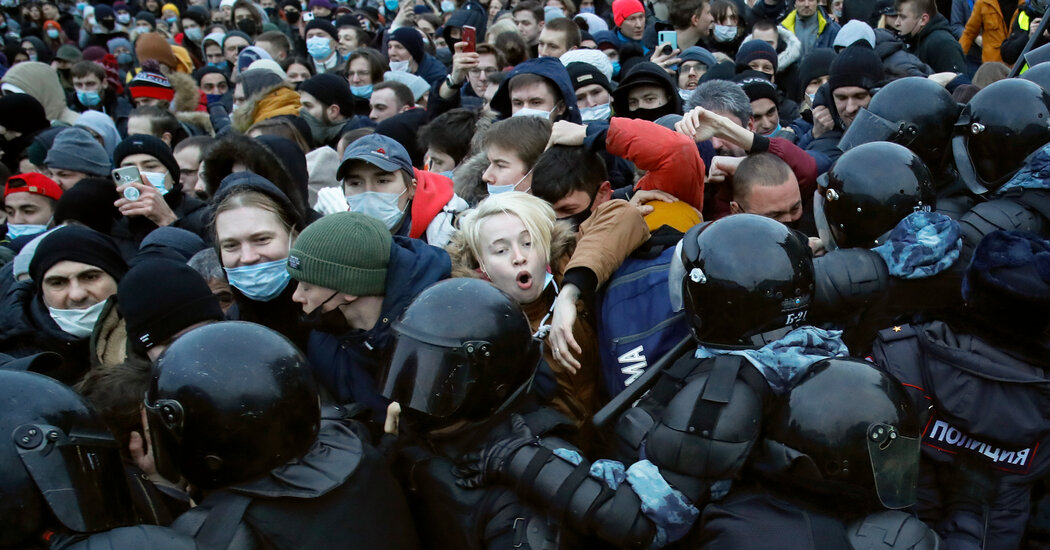
WASHINGTON — Secretary of State Antony J. Blinken said on Tuesday that governments around the world, including in Russia and China, grew more repressive last year, as the State Department released its annual report on global human rights.
The department’s 2021 Country Reports on Human Rights Practices echoes President Biden’s warnings that authoritarianism is on the rise worldwide. Its introduction cites “continued democratic backsliding on several continents, and creeping authoritarianism that threatens both human rights and democracy — most notably, at present, with Russia’s unprovoked attack on Ukraine.”
The report covers the past year and thus does not include details about Russia’s invasion of Ukraine in February. But it singled out Russia’s government as a leading rights abuser, citing reports of extrajudicial killings, arbitrary arrests, physical abuse of suspects by the police and other offenses, along with frequent impunity for accused security officials.
Among the trends Mr. Blinken highlighted was the increasingly brazen way governments were “reaching across borders to threaten and attack critics.” He described a plot to kidnap a journalist in New York that prosecutors said was orchestrated by an intelligence network in Iran, and the Belarusian government’s decision to force a Ryanair passenger flight to land so that security forces could arrest a journalist on board.
Some governments were also quick to lock up critics at home, Mr. Blinken said, listing Cuba, Egypt and Russia. More than one million political prisoners are being held in 65 countries, the report found.
China’s government “continues to commit genocide and crimes against humanity” against ethnic Uyghurs in Xinjiang and has cracked down on basic freedoms in Hong Kong, Mr. Blinken said.
One nation that saw a serious turn for the worse was Afghanistan, whose U.S.-backed government collapsed after Mr. Biden withdrew American forces from the country in August. Mr. Blinken described “a serious erosion of human rights,” including arbitrary detentions of women, protesters and journalists; reprisals against the former government’s security forces; and restrictions on the freedom of women and girls to work and study.
But the report also noted that Afghanistan’s “pre-Aug. 15 government,” led by President Ashraf Ghani, was far from an exemplary model. “Widespread disregard for the rule of law and official impunity for those responsible for human rights abuses were common,” it found — a reality that helped the Taliban maintain popular support as they battled back to power.
The report included a long list of rights violations in Saudi Arabia, America’s longtime oil-rich authoritarian partner. Among them were “serious abuses” in the conflict in neighboring Yemen, including “civilian casualties and damage to civilian infrastructure as a result of airstrikes.”
But in an echo of Saudi protestations about the rationale for the kingdom’s military campaign in Yemen, the report noted that attacks by Houthi militants in Yemen had “caused civilian casualties and damage to infrastructure” in Saudi Arabia.
Russia-Ukraine War: Key Developments
One positive sign amid the bleak landscape, Mr. Blinken said, was the successful U.S.-led effort last week to suspend Russia from the United Nations Human Rights Council.
“A country that’s perpetrating gross and systemic violations of human rights shouldn’t sit on a body whose job it is to protect those rights,” he said.
Mr. Blinken also urged the Senate to confirm Sarah Margon, Mr. Biden’s nominee to be the State Department’s top official for human rights. Ms. Margon, a former official at Human Rights Watch, was nominated nearly a year ago to be the assistant secretary of state for democracy, human rights and labor.
Although she appeared for a confirmation hearing in September, her nomination remains stalled. The top Republican on the Senate Foreign Relations Committee, Senator Jim Risch of Idaho, has criticized Ms. Margon for past tweets he depicted as unduly critical of Israel.




